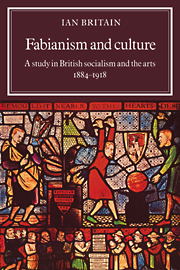Book contents
- Frontmatter
- Contents
- Preface
- List of abbreviations
- Introduction
- PART I THE LITERARY AND ARTISTIC ORIGINS OF FABIAN SOCIALISM
- PART II ART, AUSTERITY AND PLEASURE IN FABIAN SOCIALISM
- 5 The Webb partnership: the practice of renunciation
- 6 The Fabians as anti-ascetics
- 7 Powerhouse or club?: artistic activities of the Fabian Society
- 8 Platform or playhouse?: Fabian lecturing on the arts and the arts of Fabian lecturing
- PART III FABIANISM, ÉLITISM AND POPULAR CULTURE
- Conclusion
- Notes
- Bibliography
- Index
8 - Platform or playhouse?: Fabian lecturing on the arts and the arts of Fabian lecturing
Published online by Cambridge University Press: 29 September 2009
- Frontmatter
- Contents
- Preface
- List of abbreviations
- Introduction
- PART I THE LITERARY AND ARTISTIC ORIGINS OF FABIAN SOCIALISM
- PART II ART, AUSTERITY AND PLEASURE IN FABIAN SOCIALISM
- 5 The Webb partnership: the practice of renunciation
- 6 The Fabians as anti-ascetics
- 7 Powerhouse or club?: artistic activities of the Fabian Society
- 8 Platform or playhouse?: Fabian lecturing on the arts and the arts of Fabian lecturing
- PART III FABIANISM, ÉLITISM AND POPULAR CULTURE
- Conclusion
- Notes
- Bibliography
- Index
Summary
A knees-up of the kind occasioned by C.W. Marson's lecture on folk song was not a common occurrence in ordinary meetings of the Fabian Society; the subject matter of most lectures was hardly encouraging to such high jinks. This did not mean that lectures were, as a rule, dull, perfunctory affairs on dryasdust topics. From the outset, there was an intention to make lectures enjoyable in themselves — enjoyable just to listen to — as well as instructive on a wide range of topics. As one Fabian observer recalled: ‘Throughout the Victorian age political oratory was relished, like pulpit eloquence, alike as education, edification and entertainment. The agencies of public enjoyment for respectable folk were of a narrowness unimaginable … [T]he socialist revival was for a short time without a compelling speaker. Here then, in the England of the late 1880s, was a wide opening for the Fabians’.
It was an opening which they continued to exploit for the next three decades at least, after which the growth of new technological media such as the wireless and the cinema began to compete heavily with the lecture as forms both of education and entertainment. In 1894 William Clarke could write of the Society: ‘It is in lectures that its work has largely consisted.’
- Type
- Chapter
- Information
- Fabianism and CultureA Study in British Socialism and the Arts c1884–1918, pp. 192 - 220Publisher: Cambridge University PressPrint publication year: 1982



